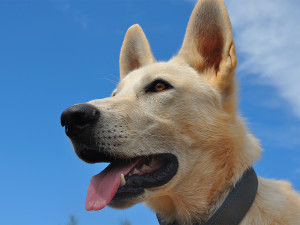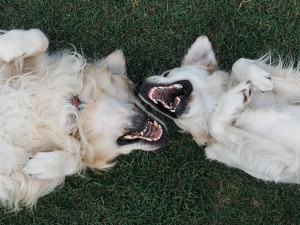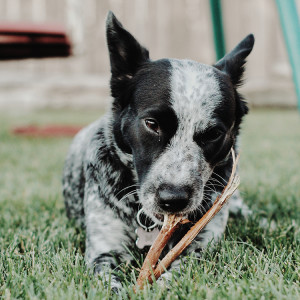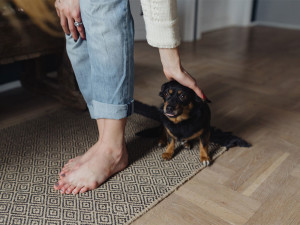Your Dog Is Grinding Their Teeth: What This Means and What to Do
It probably indicates that something is awry.
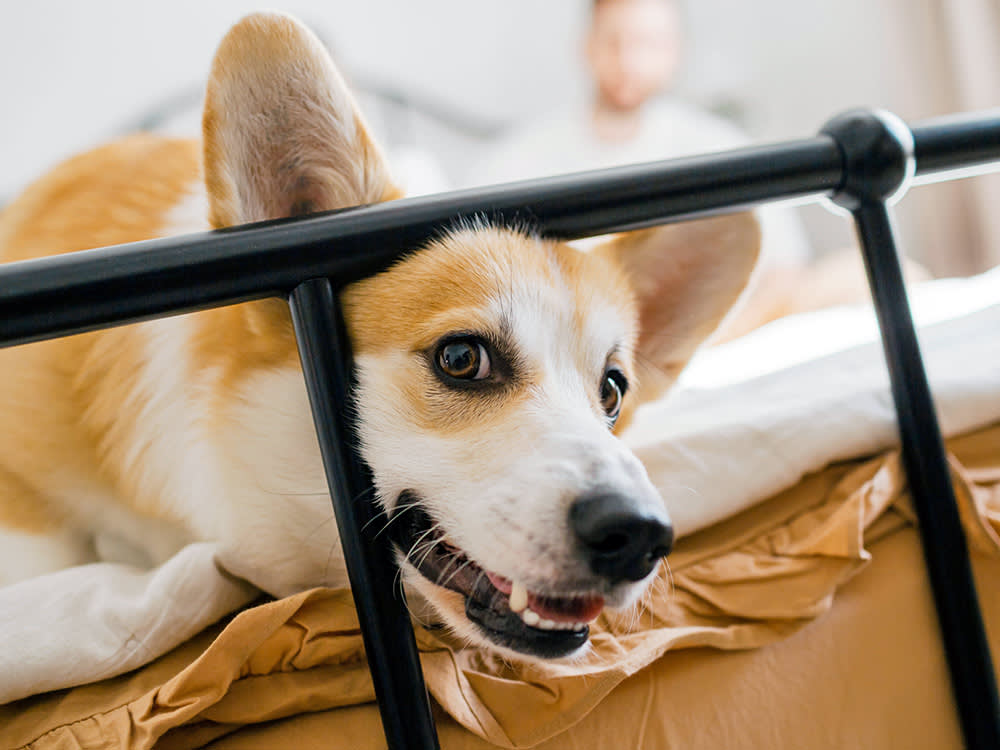
Share Article
In This Article:
What Is Teeth Grinding in Dogs?opens in a new tab Causes of Teeth Grindingopens in a new tab When Should You See a Vet?opens in a new tab How Bruxism Is Diagnosed in Dogsopens in a new tab Treatment Optionsopens in a new tab How to Prevent Teeth Grindingopens in a new tab
Tooth-grinding, or bruxism, is something that dogs will experience for a variety of reasons. If you’ve heard your dog grinding their teeth, this is not something you should just ignore. While there’s no need to panic, bruxism may be a sign of anything from anxiety to neurological issues and requires attention. Read on to understand some possible causes for it, and when you need to take your dog to a veterinarian.

littleKin™ is Kinship’s home just for puppy and kitten parents. Bop over to check out expert advice, new pet tools, and special deals—all curated for your newest family member.
opens in a new tabWhat is teeth-grinding in dogs?
Teeth-grinding, or bruxism, is a condition in which a dog will grind their teeth, clench their jaw, or occasionally chatter their teeth. This can be a chronic condition (occurring for a long time) or acute (just started, with only an episode or two).
Bruxism explained
Bruxism occurs in dogs for a variety of reasons and can be caused by many conditions — including oral pain or malocclusions, GI pain or nausea, or anxiety, just to name a few. Getting to the root of the problem will likely require the help of a veterinarian, especially if the problem is recurrent or chronic.
Causes of teeth-grinding in dogs
Dogs can grind their teeth for many reasons, including malocclusions or misaligned teeth, gastrointestinal problems (such as pain or nausea), anxiety and stress, or certain neurological conditions.
Gastrointestinal issues
If a dog has gastroenteritis, acid reflux, or any other painful condition of the GI tract, this might lead to grinding of the teeth, secondary to nausea and discomfort.
Dental issues
Malocclusions, or misalignment of the teeth, can cause the teeth to occlude into one another, causing a grinding sound. This can be uncomfortable for your dog and cause damage to the teeth or surrounding structures like the gums or palate.
Neurological issues
Epilepsy and other neurological conditions can cause chewing or biting motions, which can sound like grinding of the teeth.
Pain and discomfort
Dogs with nonspecific pain or discomfort may clench their jaws and teeth, causing abnormal grinding of the teeth.
Anxiety and stress
Similar to dogs in pain, dogs who are stressed or anxious can clench their jaws causing grinding of the teeth.
When should you see a vet for teeth-grinding?
If you notice your dog is grinding their teeth often — more than just once or twice — it might be a good idea to have your vet investigate the causes of this. Bruxism can be a symptom of pain or can result in pain for your dog, so it is important to get it investigated if it is a chronic issue.
How bruxism is diagnosed in dogs
Vet examination
Your vet will perform a thorough physical examination, including an oral exam, abdominal palpation, and neurological and orthopedic exam. They’ll look for any abnormalities or signs of discomfort.
Diagnostic testing
Your veterinarian might perform a series of diagnostic tests, including complete bloodwork testing, a urinalysis, and sometimes, radiographic imaging.
Dental evaluation
If your dog’s teeth-grinding is suspected to be due to a dental issue, a dental evaluation may be recommended. This will typically include X-rays of your dog’s teeth and probing them while under general anesthesia to look for signs of pain or periodontal disease.
Treatment options for teeth-grinding
Addressing dental issues
If your dog has a dental issue, a dental procedure may be recommended to address the problem.
Managing medical conditions
Because teeth-grinding can be caused by many conditions, such as nausea, acid reflux, or more, your veterinarian may help manage the underlying cause with a change in diet, medications, or other appropriate treatments.
Behavioral interventions
If your dog’s bruxism is due to stress or anxiety, consulting with a behaviorist or experienced dog trainer may help with some of these symptoms. Additionally, a chronically or severely anxious pup can be prescribed medications in conjunction with behavior modification training to help improve their quality of life and stress levels.
How to prevent teeth-grinding in dogs
Preventing teeth \-grinding is difficult without knowing the underlying cause. Since there are many different causes of teeth grinding, speaking with your veterinarian will be the first step in investigating the problem in order to determine a solution.
FAQs
Why does my dog make a crunching sound with their mouth?
Your dog might be grinding their teeth, also known as bruxism. This is a condition that can be caused by many factors, such as misaligned teeth, nausea, or pain. If you hear your dog grinding their teeth, it is best to have them evaluated by a veterinarian.
What does bruxism sound like in dogs?
Dogs with bruxism (aka teeth-grinding) may sound like they’re making a crunching or chewing sound. This is often a rhythmic sound, and you will hear it a few (or several) times in a row before it stops for a period of time.
Why is my dog clenching their jaw?
Dogs can clench their jaws for a variety of reasons, including stress, anxiety, pain, or neurological conditions. If this is something your dog is doing frequently or persistently — or if your dog is having difficulty opening their mouth — it is best to have them evaluated, because this may be painful for them.

Dr. Gabrielle Fadl, DVM
After graduating from Kansas State University College of Veterinary Medicine, Dr. Fadl returned to the New York area to pursue a one-year rotating internship and has been working in general practice since. Dr. Fadl loves working in the pet space to foster the powerful human-animal bond. She hopes to continually learn and grow to practice the best quality medicine. Her motto is “Keep calm and try to take it as it comes.”
Related articles
- opens in a new tab
Does Your Dog Need Anti-Anxiety Meds?
How to cope with dog anxiety—from training to medication.
![a pair of English cream retriever dogs wiggle around on their backs with big grins on their faces]() opens in a new tab
opens in a new tab80% of Dogs Have a Dental Disease — Does Yours?
Here are four common dental problems your pup might face and how to treat them.
![Dog in the grass outside chewing on a bully stick]() opens in a new tab
opens in a new tabChew on This: A Guide to Safe and Not-So-Safe Dog Bones
Two experts—a veterinary dentist and internist—rate the most popular dog bones.
![woman petting small dog that is feeling stressed]() opens in a new tab
opens in a new tabStressed Pets: How to Keep Your Dogs Relaxed When Leaving Them Alone
Tips on helping a dog deal with their daily stress.

